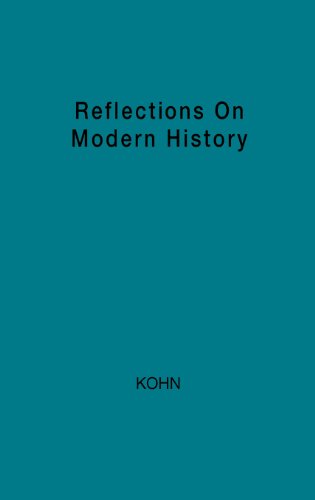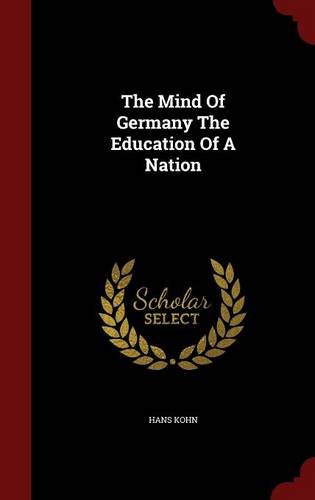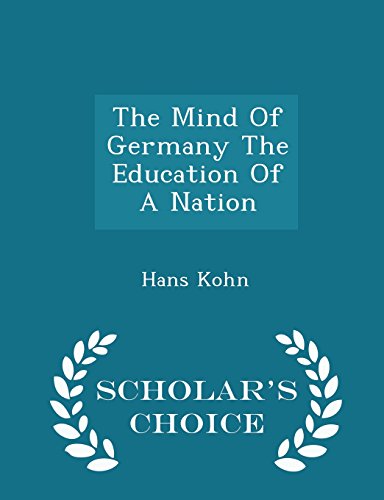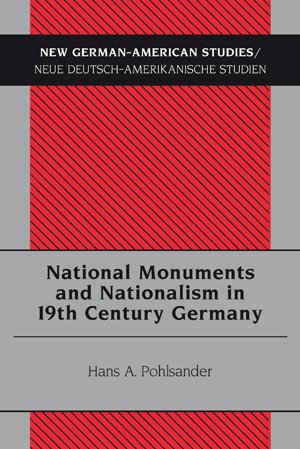Background
Hans Kohn was born on September 15, 1891 in Prague, Czechoslovakia. Son of Solomon E. and Berta (Fischer) Kohn.



( This collection of essays and addresses epitomize the t...)
This collection of essays and addresses epitomize the thinking of Kohn on how he regards the history profession, how he interprets the events of his time, and how he applies his understanding of liberalism, nationalism, and the supranational order.
http://www.amazon.com/gp/product/031320232X/?tag=2022091-20

( This work has been selected by scholars as being cultur...)
This work has been selected by scholars as being culturally important, and is part of the knowledge base of civilization as we know it. This work was reproduced from the original artifact, and remains as true to the original work as possible. Therefore, you will see the original copyright references, library stamps (as most of these works have been housed in our most important libraries around the world), and other notations in the work. This work is in the public domain in the United States of America, and possibly other nations. Within the United States, you may freely copy and distribute this work, as no entity (individual or corporate) has a copyright on the body of the work. As a reproduction of a historical artifact, this work may contain missing or blurred pages, poor pictures, errant marks, etc. Scholars believe, and we concur, that this work is important enough to be preserved, reproduced, and made generally available to the public. We appreciate your support of the preservation process, and thank you for being an important part of keeping this knowledge alive and relevant.
http://www.amazon.com/gp/product/1298523818/?tag=2022091-20

( This work has been selected by scholars as being cultur...)
This work has been selected by scholars as being culturally important, and is part of the knowledge base of civilization as we know it. This work was reproduced from the original artifact, and remains as true to the original work as possible. Therefore, you will see the original copyright references, library stamps (as most of these works have been housed in our most important libraries around the world), and other notations in the work. This work is in the public domain in the United States of America, and possibly other nations. Within the United States, you may freely copy and distribute this work, as no entity (individual or corporate) has a copyright on the body of the work. As a reproduction of a historical artifact, this work may contain missing or blurred pages, poor pictures, errant marks, etc. Scholars believe, and we concur, that this work is important enough to be preserved, reproduced, and made generally available to the public. We appreciate your support of the preservation process, and thank you for being an important part of keeping this knowledge alive and relevant.
http://www.amazon.com/gp/product/1296029743/?tag=2022091-20

(No century in modern European history has built monuments...)
No century in modern European history has built monuments with more enthusiasm than the 19th. Of the hundreds of monuments erected, those which sprang from a nation-wide initiative and addressed themselves to a nation, rather than part of a nation, we may call national monuments. Nelson’s Column in London or the Arc de Triomphe in Paris are obvious examples. In Germany the 19th century witnessed a veritable flood of monuments, many of which rank as national monuments. These reflected and contributed to a developing sense of national identity and the search for national unity; they also document an unsuccessful effort to create a «genuinely German» style. They constitute a historical record, quite apart from aesthetic appeal or ideological message. As this historical record is examined, German national monuments of the 19th century are described and interpreted against the background of the nationalism which gave birth to them.
http://www.amazon.com/gp/product/3039113526/?tag=2022091-20
Hans Kohn was born on September 15, 1891 in Prague, Czechoslovakia. Son of Solomon E. and Berta (Fischer) Kohn.
Kolvn studied at the University of Prague, where he came under the influence of Kantand Nietzsche. He was an active member of Bar Kochba, a Zionist student group. After earning his doctorate in jurisprudence in 1914, he joined the Czech regiment of the Austro-Hungarian army.
Captured by Russian forces, he was detained in camps in Samarkand and Siberia and there learned to speak Russian. He returned to Prague and in 1921 went to London where he joined the Independent Labour party led by Ramsay MacDonald, taking an active part in its affairs. He served as secretary to the Jewish delega-tion at the Paris Peace Conference, and from 1921 to 1925 was employed by the Keren Hayesod, the fund-raising arm of the World Zionist Organization. In 1928 he published A History of Nationalism in the East.
From 1925 to 1929 Kohn lived in Jerusalem, where he wrote books on the Middle East and served as correspondent for the Frankfurter Zeitung and the Neue Züricher Zeitung. He returned to Europe and in 1933 moved to the United States, where he joined the faculty of Smith College, lecturing on modern European history and the intellectual history of modern Europe. In 1949 he was appointed professor of history at City College of New York, where he remained on the faculty until his retirement in 1962.
Kohn’s main work was The Idea of Nationalism (1944), a study of the development of nationalism and univcrsalism from ancient times to 1789. This was followed by The Age of Nationalism (1962) and Prelude to Nation States (1967). He was also the author of works on Martin Buber, Heinrich Heine, and Zionist ideology and politics, as well as the editor of Ahad Ha-Am’s National-
ism and the Jewish Ethic. He also translated into German Joseph Klausner’s History of Modern Hebrew Literature. His autobiography Living in a Modern World (1954) contains a list of his publications.
( This collection of essays and addresses epitomize the t...)
( This work has been selected by scholars as being cultur...)
( This work has been selected by scholars as being cultur...)
(No century in modern European history has built monuments...)
(Intellectual history at its very best...sparkling prose w...)
(Nationalism and Realism: 1852-1879)
(Russian Studies, European History)
(martial arts)
In his writings and lectures, Kohn sought to mobilize world opinion against totalitarianism and during World War II he equated fascism with communism, telling his students that both Hitler and Stalin were gangsters. He was also an outspoken critic of American military involvement in Korea and expressed his doubts about the wisdom of rearming West Germany.
At first Kohn supported the idea of cultural Zionism but he became disenchanted with it in 1929, when he realized that the Arabs were not included in the plans for the Jewish homeland in Palestine.
